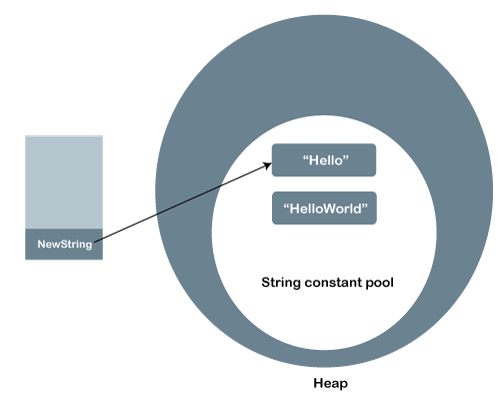Why Are Strings Immutable in Java? Finest Practices and Usage Cases
Why Are Strings Immutable in Java? Finest Practices and Usage Cases
Blog Article
What Is Immutable Strings and Just How It Works
In the realm of shows, comprehending the concept of unalterable strings is paramount for developing durable and safe applications. Immutable strings refer to strings that can not be altered after they are produced, ensuring information stability and predictability within the code.
The Basics of Immutable Strings
Unalterable strings, as a fundamental principle in programming, are personality series that can not be changed as soon as they are produced. This suggests that as soon as a string is designated a value, that value can not be altered. In languages like Python and Java, strings are unalterable items, resulting in numerous ramifications in regards to memory management and data honesty.
Among the essential benefits of unalterable strings is that they offer a complacency in data adjustment. Given that the content of an immutable string can not be customized, it ensures that the initial information continues to be intact, decreasing the threat of unplanned modifications throughout program implementation (Why are strings immutable in Java?). This building likewise streamlines debugging procedures, as programmers can rely on that as soon as a string is defined, its value will certainly not be accidentally altered
Additionally, unalterable strings help with effective memory usage. When a brand-new string is created based on an existing one, rather than customizing the initial string, the brand-new value is stored individually. This method enhances efficiency by decreasing memory fragmentation and streamlining memory allowance procedures. Overall, recognizing the essentials of immutable strings is critical for understanding programming concepts and optimizing code performance.
Benefits of Unalterable Strings
Structure upon the safety and security and efficiency benefits of unalterable strings, their advantages reach enhancing code reliability and streamlining concurrent programming tasks. By being immutable, strings can not be customized after creation, which gets rid of the danger of unexpected adjustments in the information they save. This integral immutability ensures that as soon as a string is produced, its worth continues to be consistent throughout the program's execution, minimizing the opportunities of insects triggered by unforeseen modifications.
Additionally, unalterable strings add to code dependability by making it less complicated to reason about the state of a program. Given that strings can not be transformed, designers can rely on that a string will constantly hold the exact same value, simplifying debugging and upkeep initiatives. This predictability causes a lot more steady and trustworthy codebases.

Application in Shows Languages
Within different shows languages, the incorporation of immutable strings is a basic facet that impacts how data is taken care of and adjusted within code structures. The execution of immutable strings differs across various shows languages, with each language providing its very own devices to support this principle.

In contrast, languages like C and C++ do not have integrated support for unalterable strings. Developers in these languages have article source to manually apply immutability by enforcing guidelines within their code to avoid straight adjustments to string things.
Finest Practices for Collaborating With Unalterable Strings
When managing unalterable strings in programs languages like Java and Python, sticking to ideal practices makes sure safe and secure and reliable data control. One of the vital best methods is to utilize StringBuilder or StringBuffer rather than straight controling strings, specifically when managing comprehensive concatenation operations. These classes provide mutable choices for string manipulation, helping to prevent unneeded memory allocations and enhancing performance.
Another finest practice is to use string interpolation or format works given by the language rather of manual concatenation. This not only boosts readability but likewise help in preventing common mistakes such as unintended string alterations. In addition, when dealing with sensitive data such as passwords or API tricks, it is critical to stay clear of keeping them as plain message in unalterable strings. Making use of secure storage mechanisms like char arrays or specialized collections for managing delicate information assists alleviate security threats connected with unalterable strings.
Real-world Applications and Examples
Exploring practical applications of immutable strings in numerous markets exposes their significant influence on information honesty and system reliability. In the healthcare field, immutable strings play an important function in guaranteeing the security and confidentiality of individual information. By stopping unauthorized alterations to sensitive information such check these guys out as medical records and prescriptions, immutable strings aid preserve compliance with stringent personal privacy regulations like HIPAA.
Economic establishments also benefit from the unalterable nature of strings to boost the safety of consumer information and transaction documents. Unalterable strings help avoid scams and unapproved alterations to financial info, supplying a durable defense versus cyber risks and making certain the trust and self-confidence of clients.

Conclusion
Finest practices for working with immutable strings consist of staying clear of direct alterations and using methods that return new string items. Real-world applications of unalterable strings consist of data encryption, caching, and string manipulation tasks.
Immutable strings refer to strings that can not be altered after they are developed, ensuring data integrity and predictability within the code. When a new string is developed based on an existing one, instead than changing the initial string, the new worth is saved individually.In languages like Java and Python, strings are unalterable by default, meaning that as soon as a string object is created, its value can not be altered - Why are strings immutable in Java?. Finest methods for working with immutable strings consist of preventing direct alterations and making use of approaches that return new string items. Real-world applications of immutable strings include data encryption, caching, and string adjustment jobs
Report this page